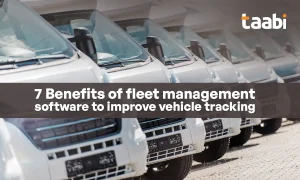Modern fuel management solutions harness real-time data analytics to monitor fuel consumption, vehicle performance, and driver behavior. This data is processed instantly, providing actionable insights for optimizing fuel efficiency, improving route planning, and enhancing operational decision-making.
Fuel management software leverage cloud computing infrastructure to securely store, process, and access vast amounts of fuel-related data. Cloud-based platforms offer scalability, real-time accessibility, and data synchronization across multiple devices, facilitating efficient fleet management.
Digital sensors play a vital role in fuel management solutions, providing accurate and reliable measurements of fuel levels and usage. Fuel management software may integrate with various onboard vehicle sensors like fuel level sensors, flow sensors, temperature sensors, pressure sensors, leak detection sensors, etc. They enhance accuracy, enable precise fuel measurement, and contribute to optimizing fleet operations for improved efficiency and cost savings.
Fuel prices can fluctuate significantly, impacting operational costs. A reliable fuel management software includes fuel price tracking, which provides up-to-date information on fuel prices. By monitoring fuel price trends, you can make informed decisions regarding refueling strategies, timing fuel purchases to take advantage of favorable pricing and minimize expenses.
Benchmarking fuel efficiency against industry standards and best practices is essential for continuous improvement. An effective fleet fuel management system facilitates fuel efficiency benchmarking, allowing you to compare your fleet’s performance with similar fleets. This benchmarking data provides insights into areas for improvement and helps establish realistic goals for optimizing fuel efficiency.
Fuel tracking system is a critical feature of an efficient fuel management solution. It incorporates digital sensors, advanced algorithms, and data analytics to track fuel consumption for your entire fleet. Fuel tracking systems provide in-depth insights for optimizing your strategies for routing, vehicle maintenance, and driver behaviour. By implementing data-driven strategies, you can minimize fuel waste and maximize efficiency, resulting in significant cost savings.
Accurate monitoring of fuel tank levels ensures timely refueling and prevents fuel shortages. A reliable fuel management software integrates fuel tank level sensors or technologies that provide real-time data on fuel levels. This information enables proactive planning, ensuring that vehicles are refueled before fuel levels become critically low.
Fuel data analytics is a powerful feature that enables in-depth analysis of fuel-related data. A robust fleet fuel management system utilizes advanced AI-driven data analytics tools to process and interpret fuel consumption patterns, costs, and trends. This enables you to extract actionable insights, make informed decisions, and optimize fuel usage based on data-driven strategies.
Predictive fuel analytics leverages historical data and machine learning algorithms to forecast future fuel consumption patterns accurately. This feature helps you anticipate fuel needs, plan refueling schedules, and optimize routes based on predicted fuel consumption. By proactively managing fuel requirements, you can minimize unexpected fuel shortages and optimize fleet operations.
Fuel theft can significantly impact operational costs and profitability. An efficient fuel management solution includes digital locking measures to detect and prevent fuel theft. This may involve integrating security features such as tamper-proof fuel caps, fuel level monitoring alarms, or GPS tracking to detect unauthorized fuel usage or fuel siphoning. Real-time alerts and notifications enable prompt action, minimizing losses due to theft.
Dynamic pricing functionality within a fuel management software enables automatic adjustment of fuel prices based on market rates. This feature ensures that your fuel prices align with current market conditions, allowing you to take advantage of favorable pricing. Dynamic pricing optimization helps reduce fuel costs and increase cost-effectiveness in fuel procurement.
Integration with fuel cards streamlines fuel transactions, eliminating manual processes and enhancing accuracy. A robust fleet fuel management system integrates with fuel card systems, enabling automatic recording of fuel transactions and seamless data integration. This integration provides detailed insights into fuel consumption, expenses, and reconciliation, simplifying financial management and ensuring accurate record-keeping.
Comprehensive fuel logging and reporting features are essential for effective fuel management. A reliable fuel management solution enables automated logging of fuel-related data, including fuel consumption, refueling events, and costs. It also generates detailed reports on fuel usage, expenses, trends, and compliance, facilitating accurate analysis and informed decision-making.
The are many Fuel management system advantages that are relevant to fleet operations and logistics businesses. By closely monitoring fuel consumption, fleet managers can identify areas for improvement, implement strategies for fuel efficiency, and reduce overall fuel costs. Fuel management software streamline processes, increase productivity, and contribute to a greener and more sustainable operation, ultimately driving success in the competitive landscape of fleet and logistics management.
At Taabi, our SaaS platform is meticulously engineered with advanced data analytics, proprietary AI/ML algorithms, and cutting-edge IoT engineering. It empowers you to analyze real-time fuel status, fuel utilization, vehicle efficiency, route details, and fuel prices. By leveraging these insights, our solution enables fleet managers to strategically optimize operations and significantly reduce operational costs. With ERP-based management controls, immediate actions can be taken based on fuel optimization insights.
Experience comprehensive fleet and logistics management solutions that delve into key metrics such as fuel consumption, idling time, route optimization, vehicle speed, traffic patterns, driver behavior, and vehicle maintenance. Maximize your annual turnover by harnessing the benefits of advanced AI/ML algorithms and real-time data analysis.
To gain a clear understanding of how our Fuel Optimization Solution SaaS works in practical scenarios and, most importantly, how it can benefit your business, we encourage you to reach out to us promptly. Our team is ready to provide free support, estimations, and a personalized quotation tailored to your specific needs.
Q. What is fleet fuel management system?
A. A fleet fuel management system is a technology-driven solution that helps businesses effectively track, monitor, and control fuel usage and expenses across their fleet of vehicles.
Q. How do you manage fuel for the fleet?
A. Fuel for the fleet can be managed through various strategies such as implementing fuel cards, establishing fuel policies, monitoring fuel purchases, and using GPS tracking to optimize routes and reduce unnecessary mileage.
Q. How do you monitor fleet fuel consumption?
A. Fleet fuel consumption can be monitored through fuel tracking systems that record fuel data from vehicles, including fuel levels, fuel transactions, and fuel efficiency metrics. These systems provide insights into fuel usage patterns and help identify inefficiencies.
Q. What is the concept of fuel management system?
A. The concept of a fuel management system revolves around optimizing fuel usage and minimizing costs within a fleet operation. It involves employing tools and practices to monitor fuel consumption, track expenses, identify wasteful practices, and implement strategies for improved fuel efficiency.
Q. What is fleet fuel efficiency?
A. Fleet fuel efficiency refers to the ability of a fleet to maximize the distance traveled per unit of fuel consumed. It is measured by calculating the fuel consumption per mile or kilometer and aims to reduce fuel expenses while maintaining productivity.
Q. What is fleet fuel consumption?
A. Fleet fuel consumption refers to the amount of fuel consumed by a fleet of vehicles within a specific timeframe. It is typically measured in gallons or liters and is an essential metric for evaluating the overall fuel usage and cost of a fleet.
Q. How do you calculate fleet efficiency?
A. Fleet efficiency can be calculated by dividing the total distance traveled by the fleet by the total fuel consumed. The resulting value represents the fleet’s fuel efficiency, indicating how efficiently it utilizes fuel to cover the distance.
Q. How is fleet cost calculated?
A. Fleet cost is calculated by considering various factors such as fuel expenses, maintenance costs, insurance premiums, depreciation, and other overhead expenses associated with the fleet. Summing up these costs provides an estimate of the overall cost of operating a fleet.
Q. How is fuel consumption calculated?
A. Fuel consumption can be calculated by dividing the total distance traveled by a vehicle by the fuel consumed during that period. This calculation is typically expressed as fuel consumption per unit of distance, such as miles per gallon (MPG) or liters per 100 kilometers (L/100km).
Q: How does a fuel management system work?
A: A fuel management system collects and analyzes real-time data on fuel consumption, tracks fuel levels, monitors vehicle performance, and provides insights to optimize fuel usage and reduce costs.
Q: What is meant by fuel management?
A: Fuel management refers to the process of effectively monitoring, controlling, and optimizing fuel usage in fleet and asset operations. It involves implementing strategies to maximize fuel efficiency and minimize fuel-related expenses.
Q: What is a car fuel management system?
A: A car fuel management system is a technology-driven solution designed to monitor and manage fuel usage in vehicles. It tracks fuel consumption, provides real-time insights, and helps optimize fuel efficiency for cars and other vehicles.
Q: What are the benefits of a fuel management system?
A: The benefits of a fuel management system include improved fuel efficiency, reduced costs, enhanced operational control, accurate reporting, better decision-making, compliance with regulations, and prevention of fuel theft.
Q: What is the main function of a fuel system?
A: The main function of a fuel system is to store, deliver, and supply fuel to the engine of a vehicle. It ensures the proper flow and control of fuel, facilitating the combustion process for engine operation.








